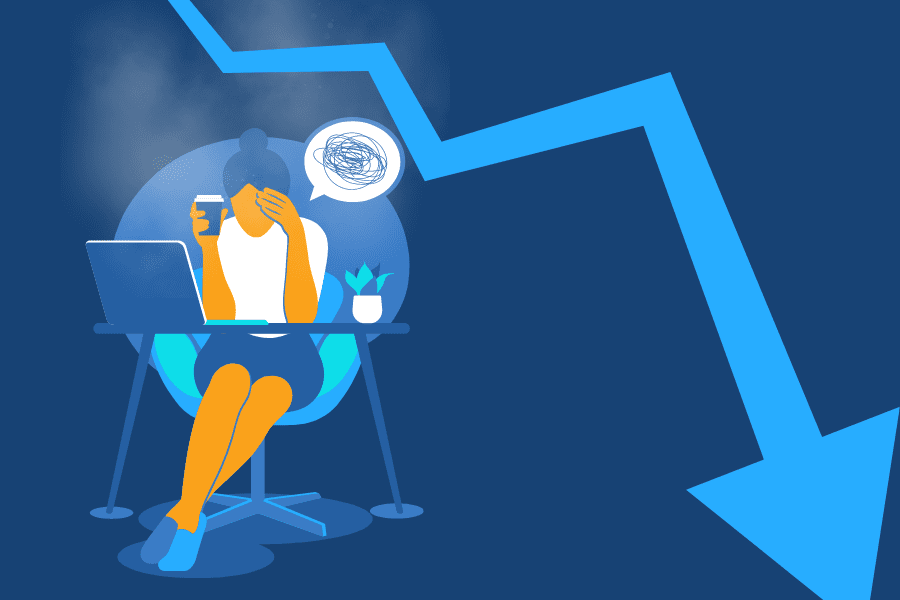Brain Fog Overview
What Is Brain Fog?
Brain fog is a term used to describe feelings and symptoms that affect a person’s ability to think.
Brain fog can affect a person’s ability to focus and think clearly, making it hard to remember things.
Many people experience brain fog from time to time, especially when they are stressed, tired, or sick. But sometimes, a person may feel that their brain fog is not going away.
What Does Brain Fog Feel Like?
Occasionally, many people experience mental fogginess or become mentally fatigued or forgetful, especially as they grow older.
But brain fog can happen to anyone at any age.
Brain fog can make a person feel mentally fatigued and fuzzy.
They may feel confused and find it hard to focus and concentrate on everyday things.
Brain fog can make it hard to complete everyday tasks or do things that one would consider easy and a normal part of their routine.
What Is An Example Of Brain Fog?
Moments of brain fog can range in severity.
For some, an example of brain fog could be walking into a room and forgetting what they went in there to do or you’re listening to a person talk and having trouble understanding what they are saying.
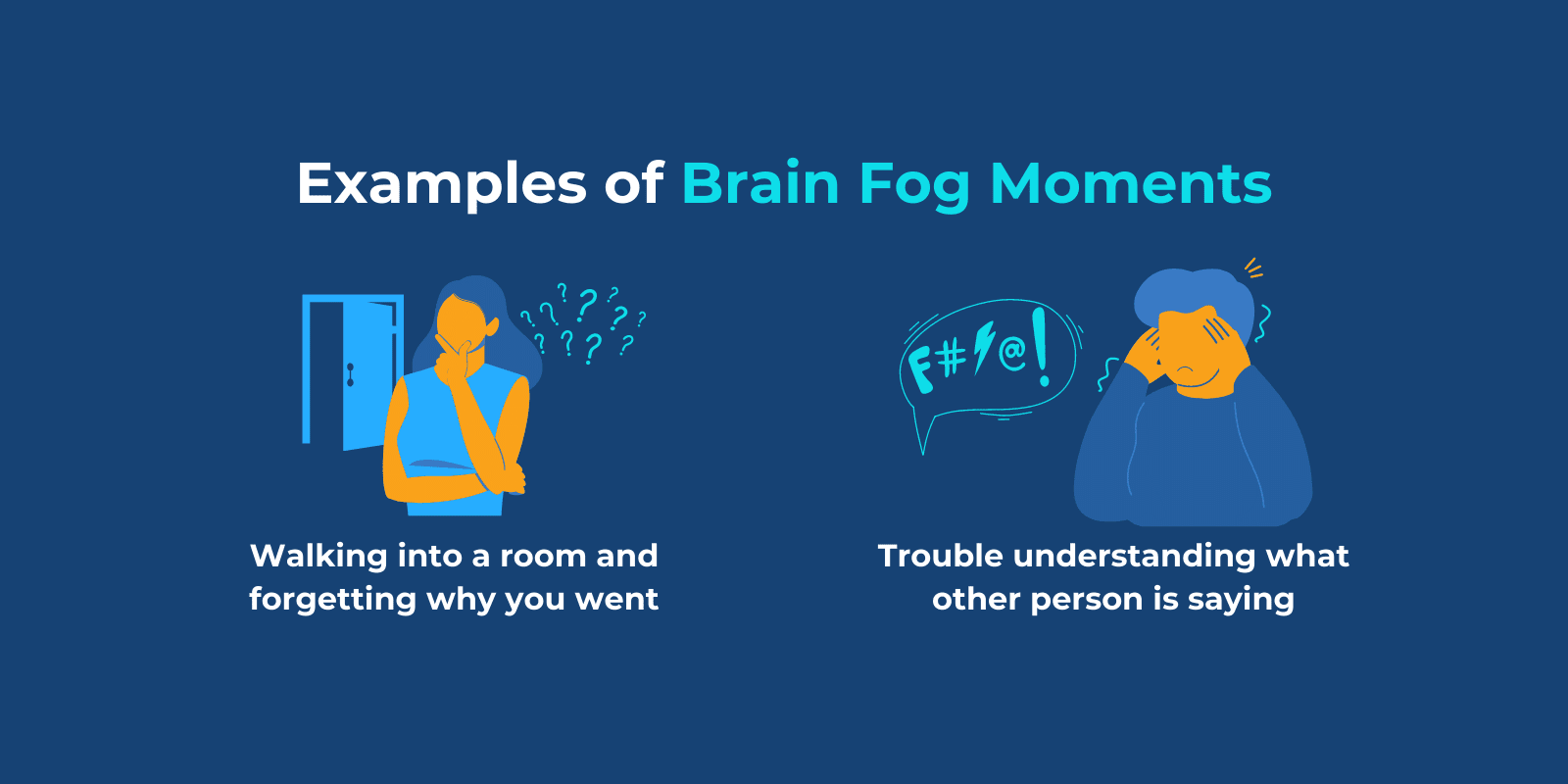
Is Brain Fog Common?
Occasional brain fog is fairly common, but a person should seek help if it affects their everyday life.
Is Brain Fog Serious?
Brain fog can become a serious problem if left untreated.
It can impact a person’s life and make it very difficult to perform everyday tasks, keep up with responsibilities, and maintain important relationships.
Is Brain Fog A Mental Illness?
Brain fog is not a mental illness but can be a symptom of common mental health conditions like stress, depression, or anxiety.
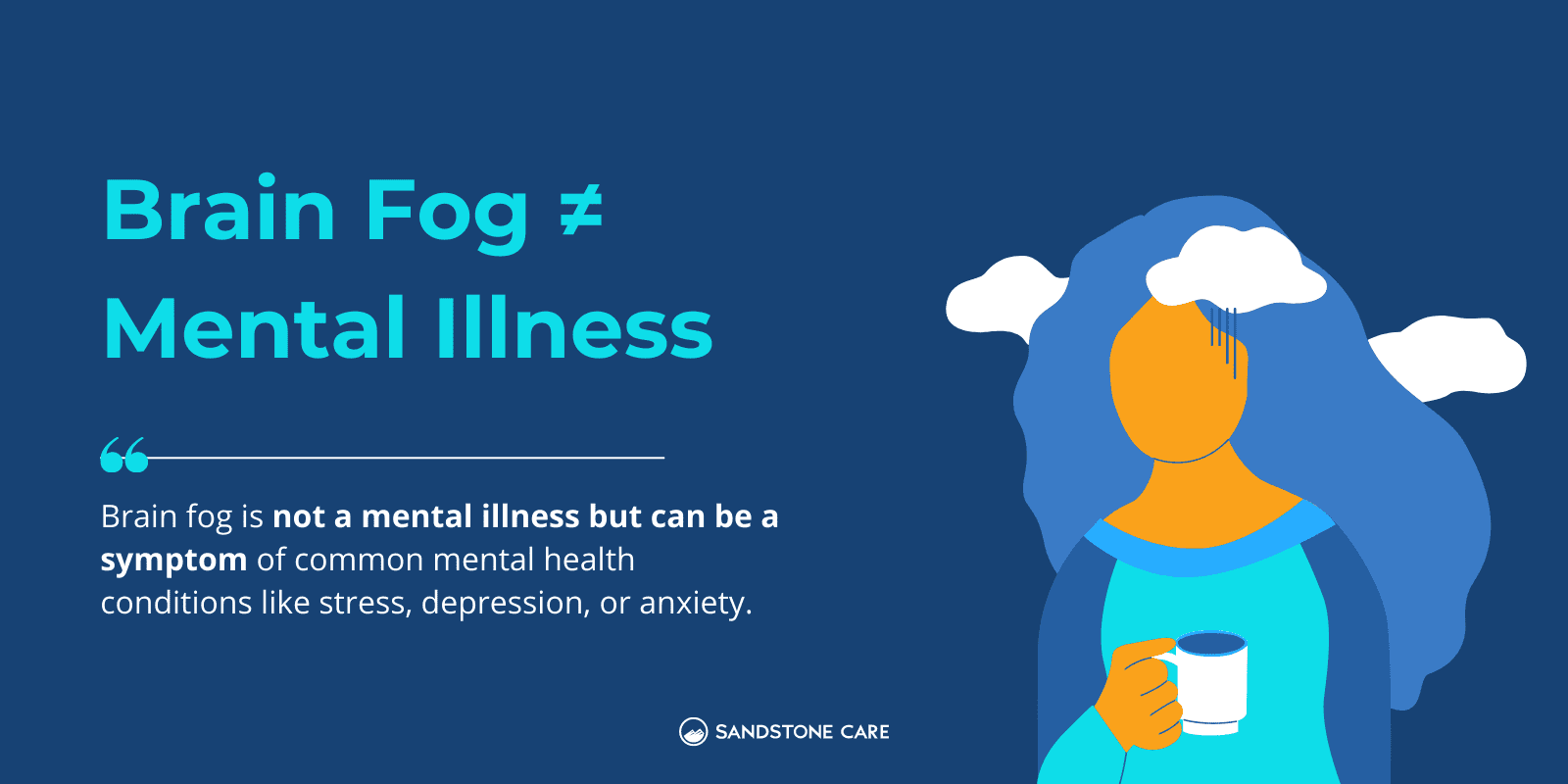
What Causes Brain Fog
What Causes Excessive Brain Fog?
There can be numerous causes of excessive brain fog.
Brain fog may stem from certain mental health conditions, medications, drugs, medical conditions, hormonal imbalances, or stress, among many other things.
What Is The Most Common Cause Of Brain Fog?
According to the Journal of Psychosocial Nursing and Mental Health Services, brain fog is commonly linked to neuroinflammation.
Neuroinflammation can be caused by infection, injury, neurodegenerative disease, or aging.
What Are 6 Possible Causes Of Brain Fog?
Brain fog may be caused by a number of different reasons, including:
- Stress
- Hormonal changes
- Diet
- Lack of sleep
- Medications
- Medical conditions
Additionally, individuals going through menopause may also experience symptoms of forgetfulness, difficulty thinking clearly, and trouble concentrating.
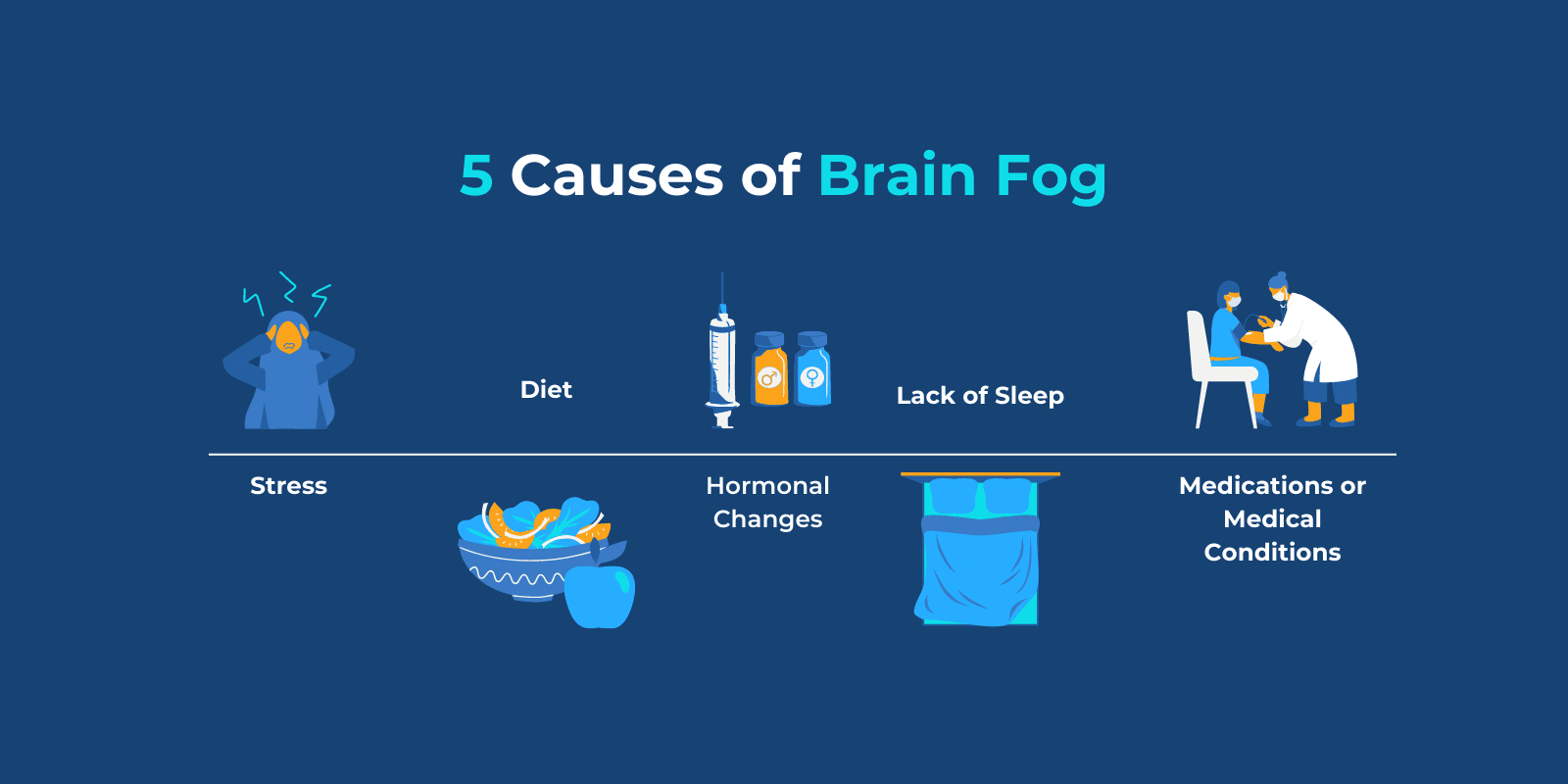
Does Overthinking Cause Brain Fog?
Brain fog may come as a symptom of overexertion, whether it be mentally or physically.
When a person becomes stressed, it can affect cognitive functions and cause a person to feel mentally fuzzy.
Overthinking and stress can affect a person’s mental health and make it very difficult to think clearly and concentrate on everyday things.
What Organ Can Cause Brain Fog?
Many different conditions that occur in different organs of the body can contribute to brain fog.
Occurrences in the digestive system can lead to inflammation that increases symptoms of brain fog.
The liver also plays a big role in cleansing toxins and storing vitamins and minerals. Having problems with the liver can cause problems in the rest of the body, including brain functions.
Brain fog can stem from numerous medical conditions, like hypothyroidism, diabetes, lupus, and multiple sclerosis.
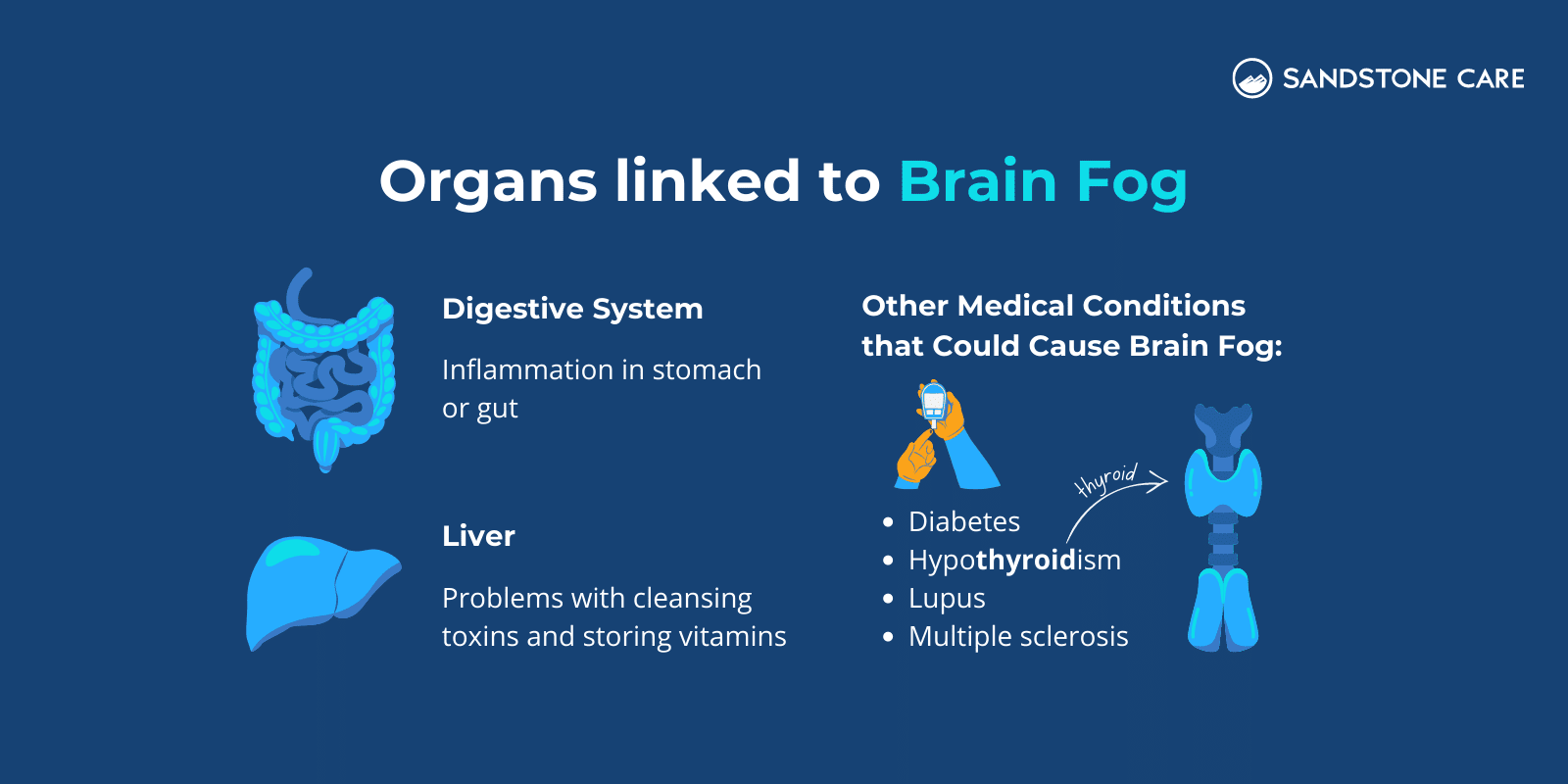
Can Dehydration Cause Brain Fog?
A person’s diet can be a major contributor to brain fog, along with dehydration.
When a person is not giving their body what it needs, it can affect the brain and its functioning.
A lack of necessary nutrients can cause problems throughout the body and mind.
What Neurological Disorder Causes Brain Fog?
There are several neurological disorders that can cause brain fog as a symptom, including:
- Fibromyalgia: a chronic pain disorder that can also cause fatigue, sleep disturbances, and cognitive symptoms such as brain fog.
- Chronic Fatigue Syndrome: a complex disorder characterized by severe fatigue that is not improved by rest, and can also cause cognitive symptoms such as brain fog.
- Migraine: a type of headache that can also cause cognitive symptoms such as difficulty with memory, focus, and communication.
- Depression: a mental health disorder that can also cause cognitive symptoms such as difficulty focusing and making decisions.
- Multiple Sclerosis: a chronic disease that affects the central nervous system and can cause cognitive symptoms such as difficulty with memory and concentration.
- Lyme Disease: an infection caused by bacteria that can cause neurological symptoms such as brain fog, memory problems and cognitive decline.
- Alzheimer’s Disease: a neurological disorder that goes beyond mental fuzziness, individuals who begin to develop Alzheimer’s disease often experience problems with cognition, and memory loss that relate to brain fog and alert them to seek help.
These are some examples of neurological disorders that can cause brain fog, but there are many other conditions that can also cause this symptom. It’s important to consult a doctor if you are experiencing brain fog as they will be able to help you determine the cause and recommend appropriate treatment.
What Can Vitamin Deficiency Cause Brain Fog?
Vitamin deficiencies that may contribute to brain fog can include:
- Vitamin B12
- Vitamin D
- Iron
- Omega-3 fatty acids

What Are Brain Fog Symptoms?
What Are The Symptoms Of Brain Fog?
Common brain fog symptoms include impaired focus, memory issues, lack of mental clarity, confusion, and mental fatigue. These symptoms vary in severity from person to person and can make completing daily tasks like work assignments and chores more difficult than usual.
What Does Brain Fog Feel Like Physically?
A person who is experiencing brain fog may also feel physical side effects.
This can include:
- Fatigue and tiredness
- Headaches
- Trouble multitasking
- Disorganization
- Decreased productivity
- Difficulty communicating
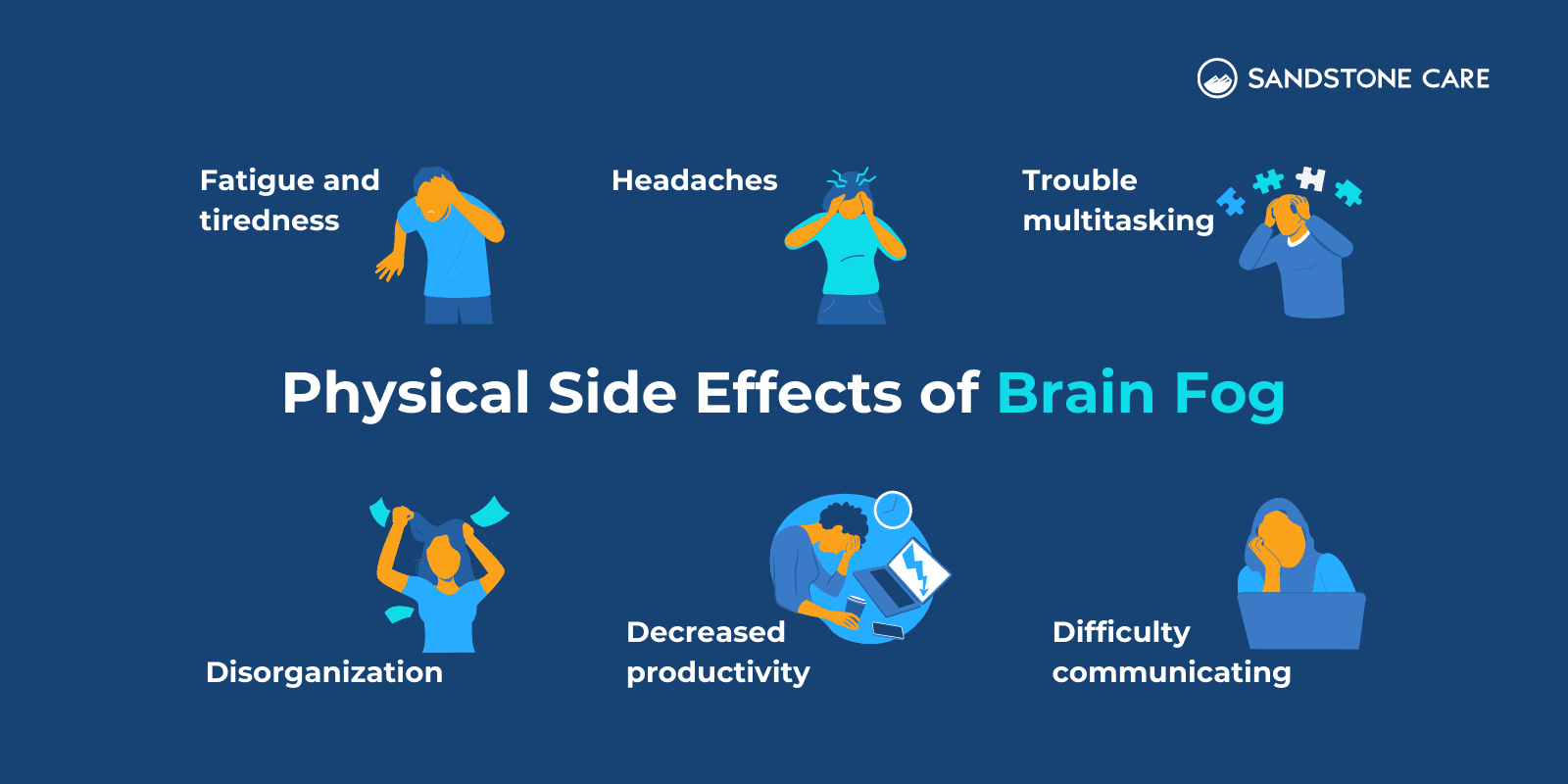
When Does Brain Fog Become A Concern?
When a person experiences persistent feelings of brain fog, they should reach out for help.
Many people experience brain fog occasionally or at some point in their life, possibly from stress or lack of sleep. For some, it goes away on its own. But, for others, there may be an underlying problem that is causing brain fog.
It is important to find the root cause of the problem so that a person receives proper treatment. The longer it goes on, the more serious it can become.
Does Brain Fog Make You Feel Weird?
Brain fog can make a person feel unlike themselves.
It can make a person feel weird or out of character. They may find it hard to carry out daily responsibilities, maintain relationships, or understand others.
Brain Fog Diagnosis
How Is Brain Fog Diagnosed?
Brain fog is not a medical condition that requires a clinical diagnosis.
It is more so a term that is used to describe feelings of mental sluggishness, fatigue, and forgetfulness.
However, brain fog can often be a symptom of medical and mental health conditions that require a diagnosis.
When a person is experiencing brain fog, a doctor may assess their mental health, diet, physical activity, and current medications or supplements.
They will also often do blood tests that can help them see if there are any deficiencies or imbalances that may be causing brain fog.
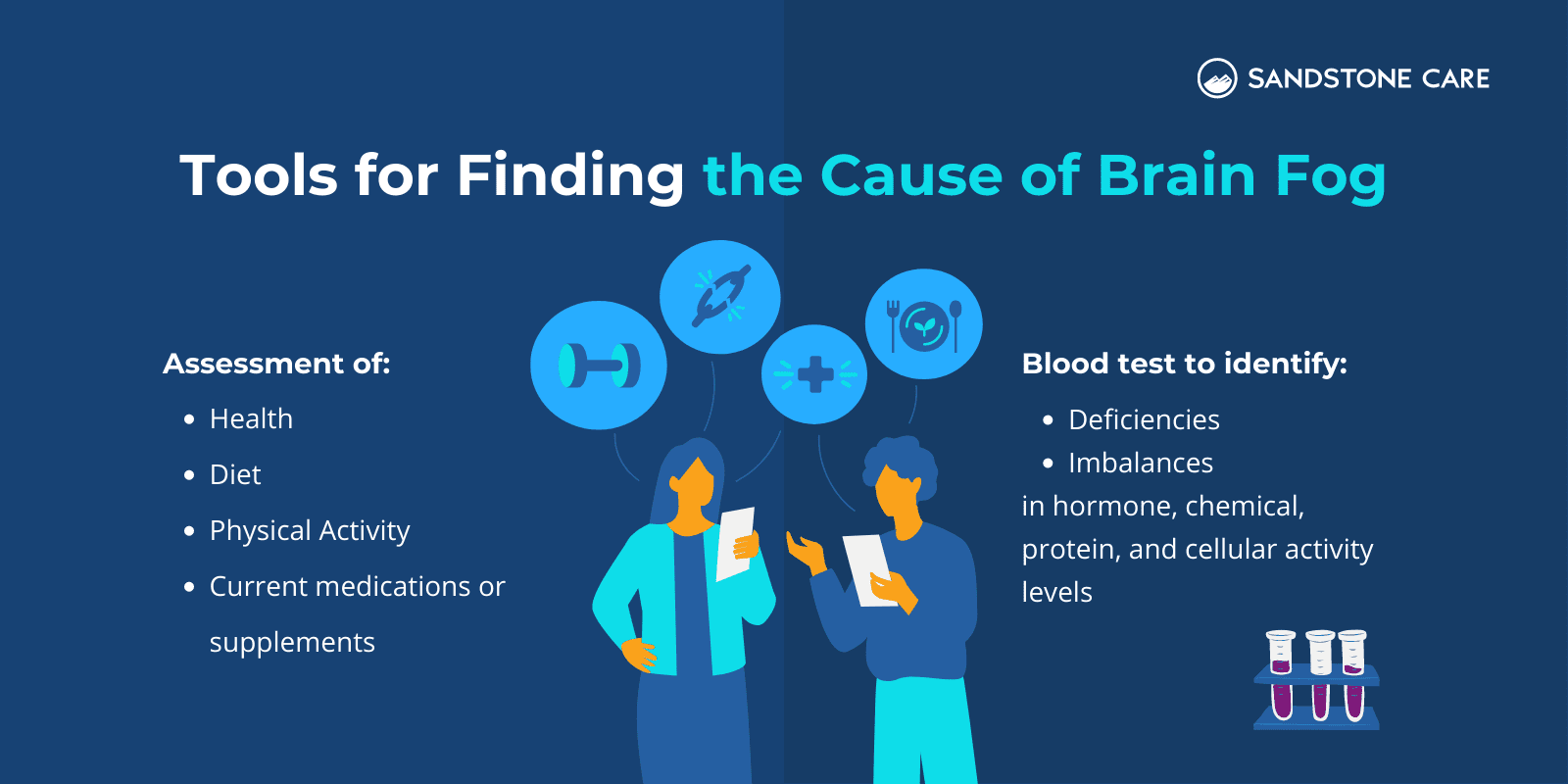
Can Drugs Cause Brain Fog?
Yes, medications and drugs can cause brain fog.
Many medications can contribute to sleep problems, thinking problems, and brain fog.
If you are taking a medication and experience feelings of brain fog, you should let your doctor know so that they can give you medical advice.
What Drugs Make You Foggy?
Medications and drugs that may make a person foggy can include:
- Benzodiazepines
- Antidepressants
- Opioids
- Anti-psychotics and mood stabilizers
- Anti-seizure drugs
- Sleeping aids
Some people who have also undergone cancer treatment may experience cognitive impairment similar to brain fog, known as “chemo-brain.”
What Drugs Cause Mental Confusion?
Both prescription and non-prescription medications can cause side effects of mental confusion.
This can include antihistamines, antidepressants, sedatives, tranquilizers, anticholinergics, antispasmodics, and more.
Covid Brain Fog
How Long Does Covid Brain Fog Last?
With covid-19 pandemic, the conversation about brain fog has been on the rise.
People recovering from covid-19 have found themselves experiencing brain fog, trying to pinpoint where it came from.
Some may experience brain fog for a short time after getting covid, while others may have brain fog that lasts for weeks, months, or even longer after a person has recovered from covid-19.
Sometimes symptoms of long covid may go away and come back.
It can be hard for healthcare providers to diagnose symptoms that result from long covid because there are no tests that determine if your symptoms or condition are a result of covid.
It is important to communicate with your healthcare provider about all your symptoms and any new problems that may occur.
More research is being done to better understand long covid conditions so that researchers can also understand the most effective treatment approaches.
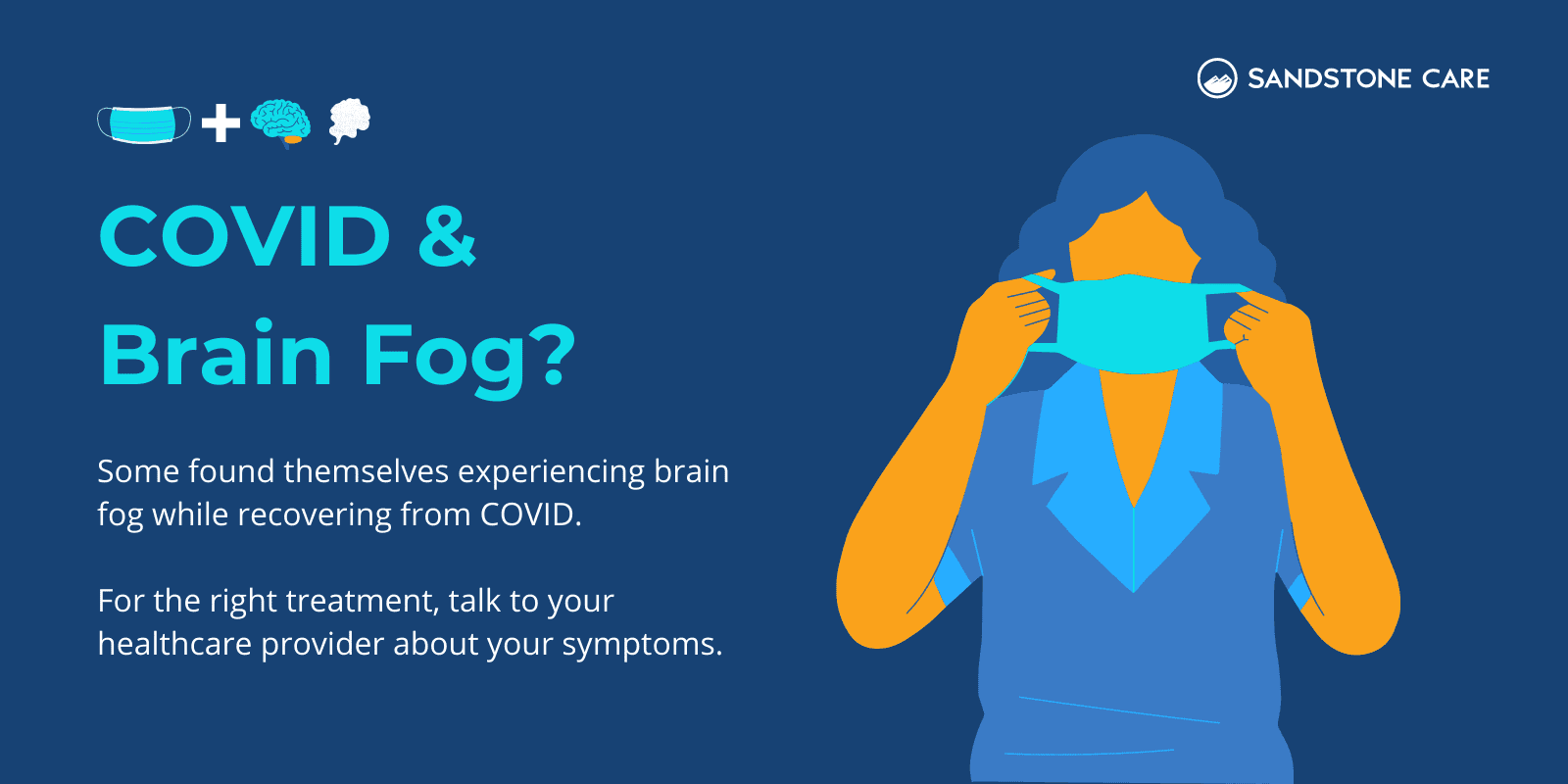
Is Brain Fog A Symptom Of Long Covid-19?
Individuals experiencing the effects of long covid-19 have found changes in their memory, focus, and cognitive function since recovering.
Brain fog is a common symptom of long covid-19, along with difficulty breathing, heart palpitations, sleep problems, and mental health conditions such as depression or anxiety, according to the CDC.
How Do You Get Rid Of Brain Fog From Covid?
Some ways to help manage the feelings that come along with brain fog can include:
- Reducing stress
- Limiting time on screens
- Eating a balanced diet
- Getting exercise and spending time outside
- Avoiding alcohol and caffeine
If you believe you are experiencing brain fog as a result of the coronavirus and the feelings persist or even worsen over time, you should consult with a healthcare provider to get professional advice.
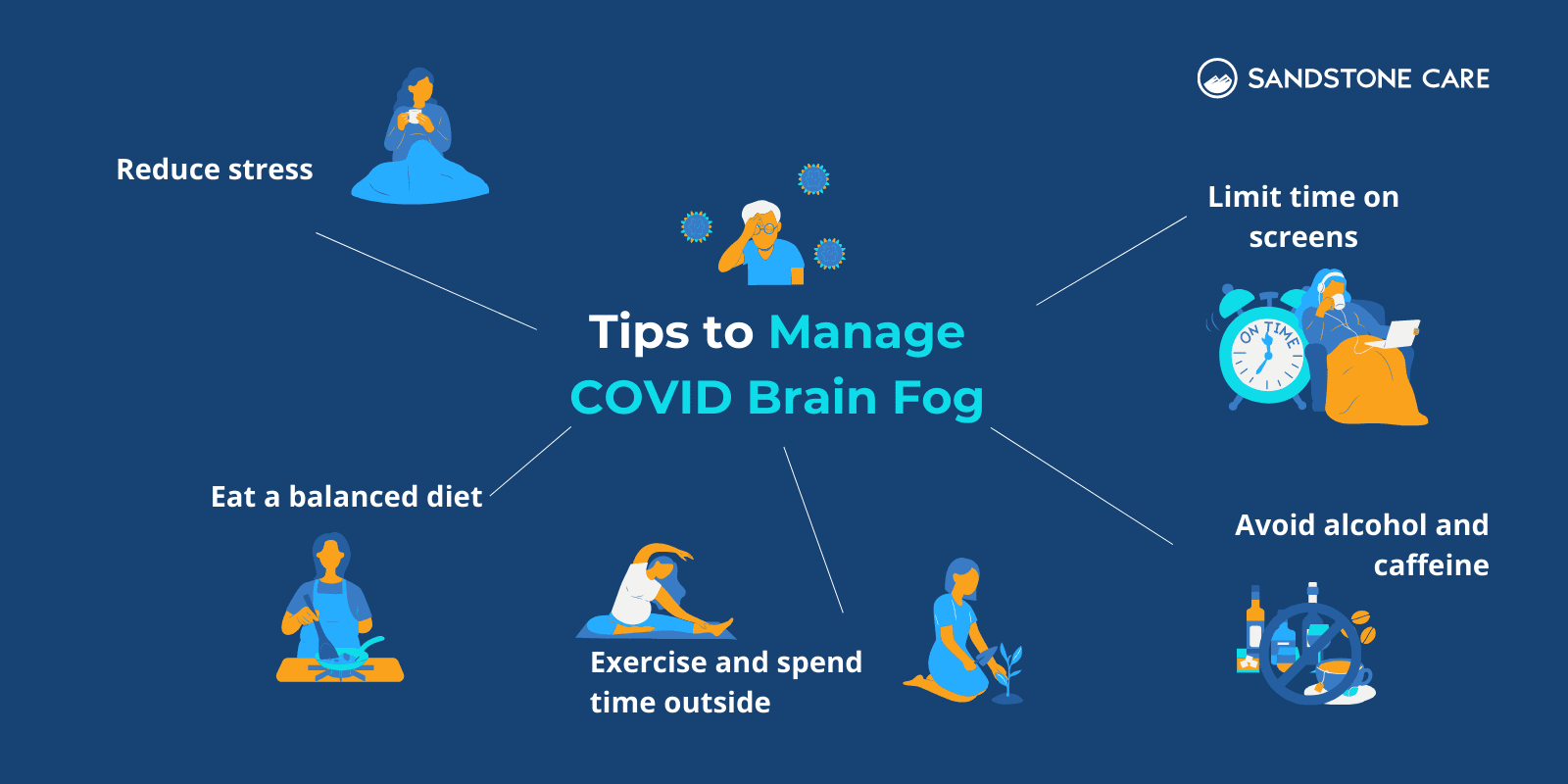
How to Get Rid of Brain Fog (Treatment)
Does Brain Fog Go Away?
For some people with brain fog, it may go away on its own.
However, for others, it may worsen with time if the root problem is not treated.
Brain fog, for some, may last for days, while others last for weeks, months, or even longer.
What Is The Best Way To Treat Brain Fog?
Finding the best way to treat brain fog starts with understanding where it may be coming from.
For example, if it is anxiety that is causing the brain fog, a person would likely benefit from therapy to address the anxiety and learn how to understand and cope with it.
Through therapy, a person can learn how to understand their thoughts, feelings, and behaviors, and also develop healthy coping mechanisms and gain clarity.
What Is A Natural Remedy For Brain Fog?
Getting good nutrition through your diet is an important natural remedy for brain fog.
Brain fog commonly stems from imbalances in hormones or deficiencies in certain nutrients in the body. By eating a healthy, balanced diet and keeping hydrated, a person can help bring their body and mind back into balance.
Other natural remedies for brain fog can include:
- Getting good sleep
- Practice stress-relieving activities like meditation, yoga, stretching, or journaling.
- Exercising and spending time outdoors
You should also talk to your doctor if you plan on taking any supplements to help with brain fog and to ensure the safety of their use.
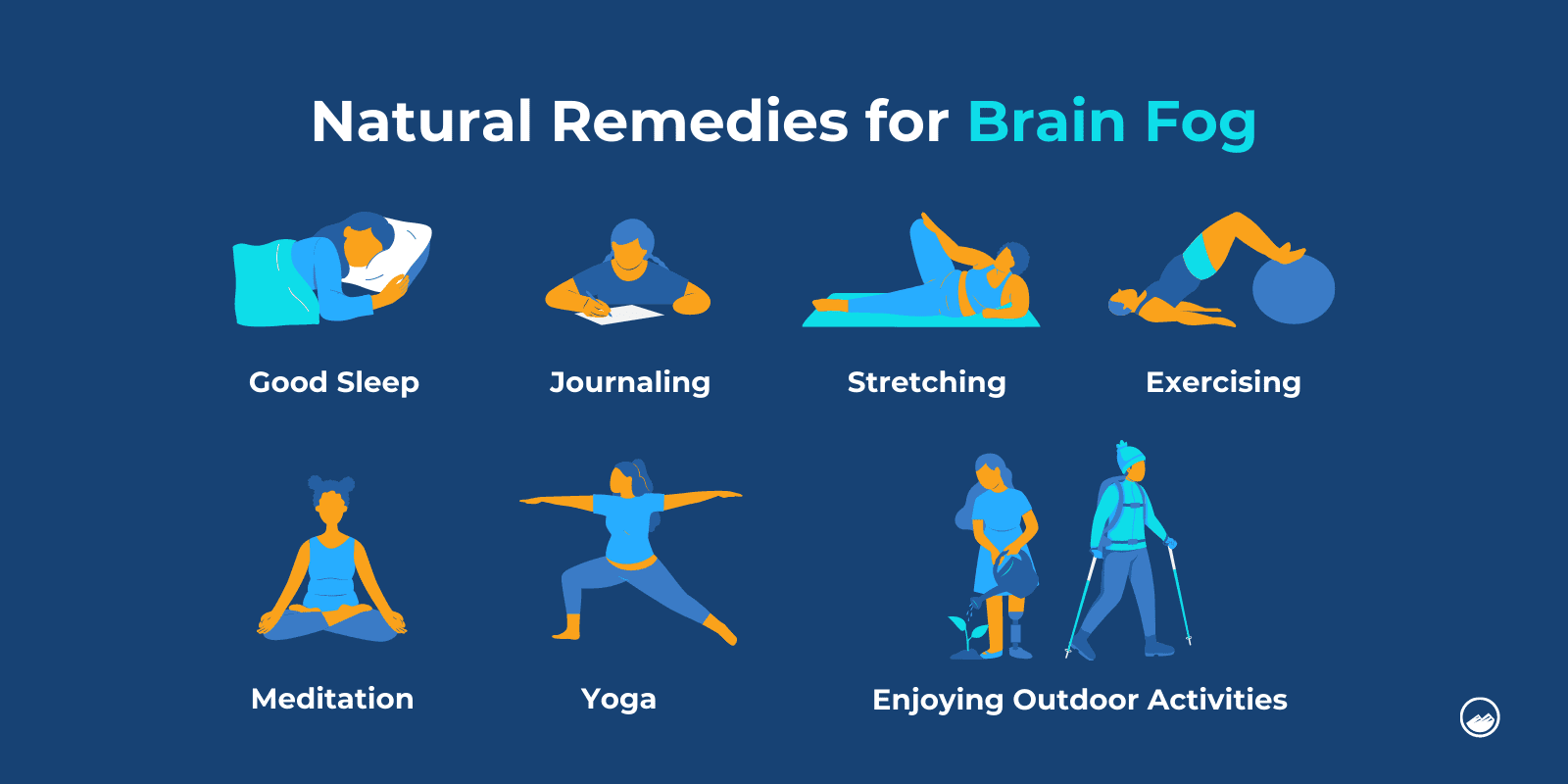
Should I See A Neurologist For Brain Fog?
While brain fog is fairly common, it can be a symptom of something potentially serious.
You should seek help and possibly see a neurologist if your feelings of brain fog persist or worsen over time.
A neurologist can perform appropriate tests and can help determine if there are any underlying neurological conditions that may be causing brain fog.
Is There A Vitamin For Brain Fog?
Vitamin D is an important nutrient that plays a role in the immune system, brain health, and more.
Individuals who are vitamin D deficient may often see negative effects on their cognitive functions and experience depressive symptoms, poor concentration, and memory problems.
Other vitamins that may help improve problems that come with brain fog can include omega-3 fatty acids, magnesium, and vitamin C.
However, it is important to consult with your doctor about the safety and effectiveness of taking vitamins as a remedy for brain fog, especially if you are taking any medications. Research is still being done to determine how effective supplements are in reducing brain fog.
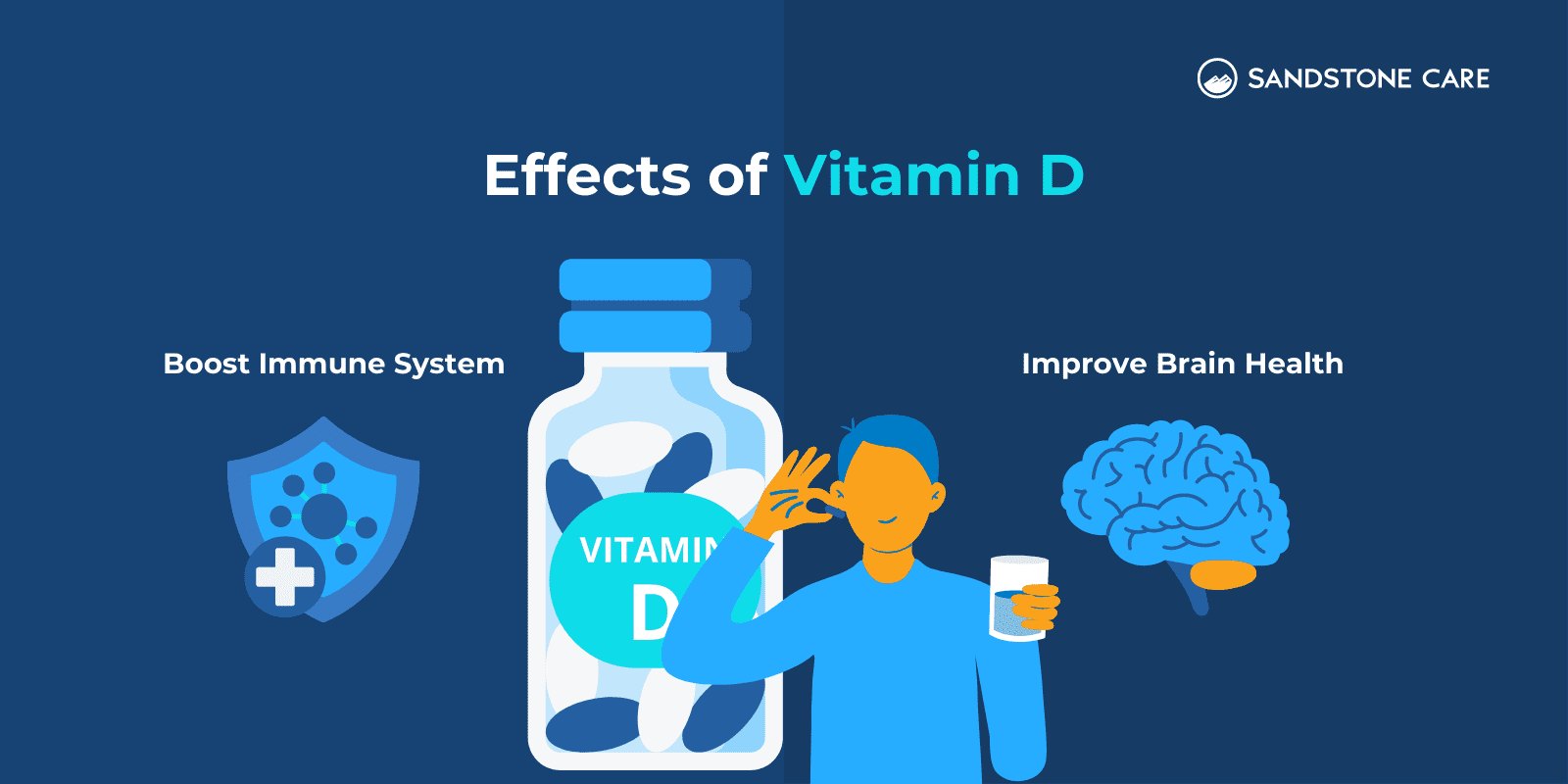
Is There Medicine For Brain Fog?
There are currently no medicines approved for use in treating brain fog.
How Do You Fix Fatigue And Brain Fog?
To fix fatigue and brain fog, a person should focus on building healthy habits and taking care of their mind and body.
Eating a balanced diet and making sure your body is getting what it needs is a big part of both physical and mental health.
Movement and exercise can help reduce feelings of stress and depression and improve a person’s mood.
Additionally, getting enough sleep plays a big role in a person’s energy and mood levels.
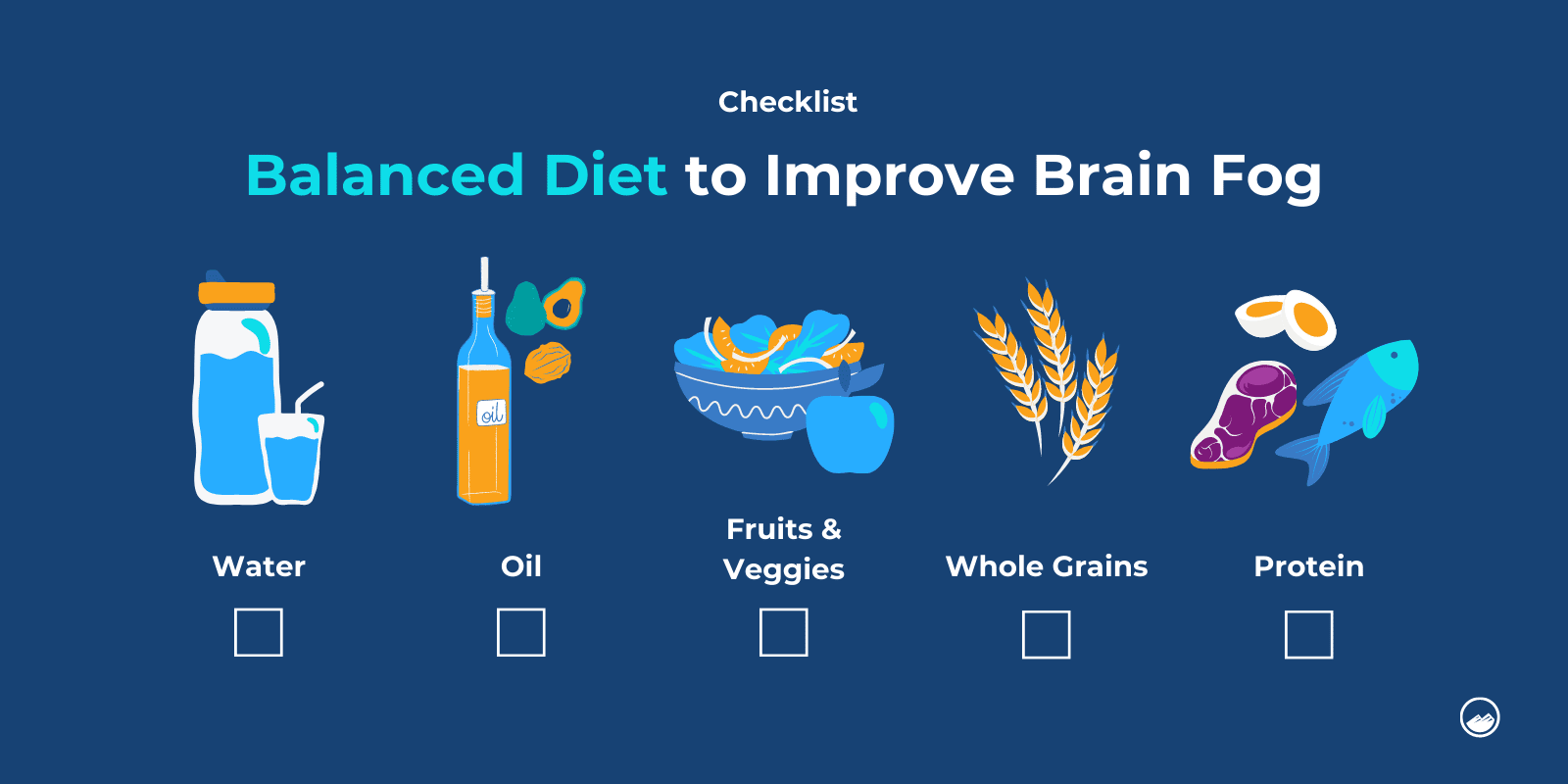
Some people also tend to overlook the importance of interaction and connection with others.
When the covid-19 pandemic hit, people became isolated and lost a large sense of human interaction and connection.
Through talking and connecting with others, a person can find clarity, comfort, and understanding.
Many people tend to overwork and overexert themselves, which begins to affect both their physical and mental health, even if they don’t notice it right away.
One of the biggest things a person can do when they feel fatigued or mentally fuzzy is to give themselves a break and take care of themselves. Sometimes, people need to take time to reset and relax in order to find clarity and understanding.


Let’s take the next steps together
Brain fog involves feelings of mental fuzziness, mental fatigue, and forgetfulness than can be an indicator of an underlying condition. Sandstone Care is here to support teens and young adults with mental health and substance use disorders.

